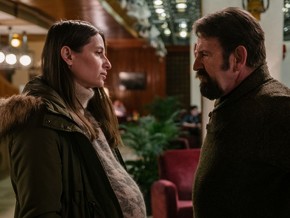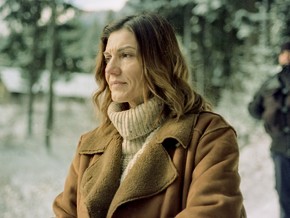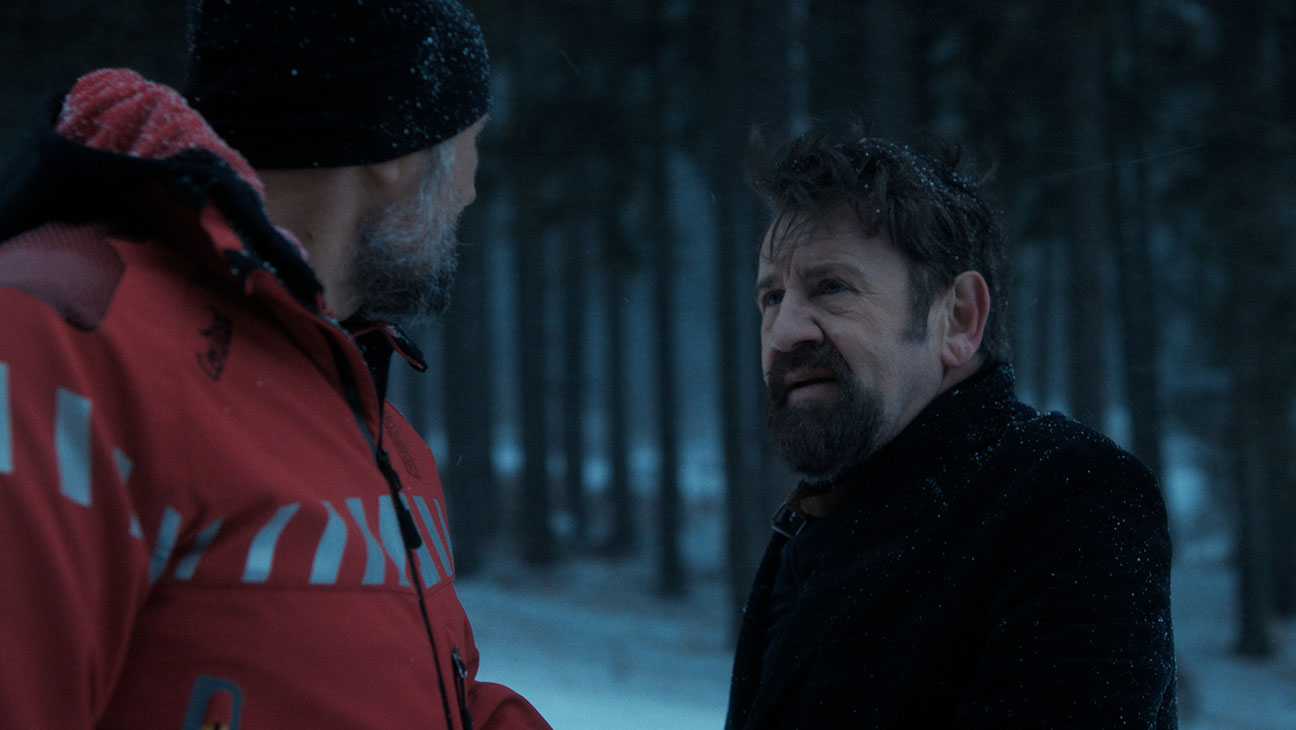



Today’s trek on Around the World with Netflix is a Romanian drama about power, obsession, guilt and regret.
“The Father Who Moves Mountains (Tata mută munții)” takes us into the Romanian winter where a politically-connected father (Adrian Titieni) frantically tries to organize the rescue of his son, lost-in-the-snowy Bucegi Mountains.
Mircea could be a villainous hero or a heroic villain in this tale. His obsession, the bullying and bribing, reason-ignoring and rule-bending he does in pursuit of his single-minded goal summons up memories of Romania’s bad old days, the Ceausescu police state where having power meant the rules were different for you.
He’s older, retired, a man who cheated on his first wife (Elena Purea) and is about to be a father again with his younger second bride (Judith Slate). He’s dyed his hair and his beard to match his new wife and new life.
When we meet him, he’s clumsily decorating a Christmas tree. We instantly gather that he’s important enough to ignore his phone, which is blowing up, to pay little heed of the TV, which is reporting two missing college kids in the mountains.
Then he answers the call. He rushes to the ski resort where this happened. The rescue team’s leader (Valeriu Andriuta) assures him that everything that can be done is being done. He won’t let Mircea go up to look for himself because “we’d have to rescue you” (in Romanian with English subtitles).
Mircea pleads “We can’t wait until morning,” and that “I have to do SOMETHING,” to the searchers and to his trusted aide (Virgil Aioanei).
He doesn’t want to hear “It’s in God’s hands now,” is even willing to pay the searchers to redouble their efforts. He’s not used to hearing “No.” He won’t stand for “nothing more can be done.” The family of the coed his son was hiking with are here, and relating “clairvoyant” relatives’ intuition to him, but he holds his temper.
And then his ex-wife arrives, and we pick up on their unresolved issues and the grief and rage which her Orthodox faith cannot lessen. His current wife shows up, too, pregnant and increasingly concerned.
When the once-powerful man takes matters into his own hands, her concern seems justified.
I like the way writer-director Daniel Sandu (“One Step Behind the Seraphim”) doles out the layers of Mircea’s entitlement, the help he summons that would not be available to the average citizen in today’s Romania, his “not my problem” attitude toward the family of others missing on that mountain.
The film never crosses from drama into thriller. There’s little suspense, and like Mircea, the viewer can wonder where the sense of urgency is.
The tech and military efficiency deployed in the story’s third act doesn’t change that, or fundamentally alter Mircea’s mental state or sense of lost power and the lack of control.
Titieni’s performance takes the character from brusque to what can feel like a performative level of compassion and concern, into guilt for the son he wasn’t there for and the wife he abandoned.
Mortality works its way in here as well. He can’t keep up with the search teams, can’t bull his way through this predicament toward any satisfactory conclusion.
The rocky terrain and snowy fog make a striking setting for this intimate morality tale, and Titieni’s compelling turn as a figure whose bull-in-a-china-shop present suggests a sinister past make this story of power, influence and their limits when life and death are on the line well worth watching.
Rating: TV-MA, smoking, profanity
Cast: Adrian Titieni, Judith State, Elena Purea, Virgil Aioanei,
Tudor Smoleanu and Valeriu Andriuta
Credits: Scripted and directed by Daniel Sandu. A Netflix release.
Running time:


Roger: I just finished watching this movie (The Father Who Moved Mountains). My question is: if this is a true story why can’t I find any news media about this event or whatever happened to the real family based on this story. I cannot find anything about it at all. Is this a true story? It’s claims it is, so why can’t I find any information about it. I want to know the real story and what actually happened to this family. Could you please help me. I really respect what you do, you are an intelligent man and very thorough at what you do. I would appreciate it if you can tell me where I could find this information. Thank you – Your Kentucky fan.
That term “Inspired by a true story” is used awfully freely these days. I did not write that down in my notes, which I almost always do when that is an opening credit, so I will have to check back to see. (Just checked. There is no “true story” credit to open the film). It doesn’t seem like either a true story or even if it was, one that would have been reported when it happened, or a news story that would have been translated into English so that we could Internet search for it.
https://jurnalul.ro/special-jurnalul/cosmar-in-bucegi-26-de-zile-de-comedie-neagra-141211.html
https://www.mediafax.ro/social/trupul-unui-tanar-disparut-in-noiembrie-in-bucegi-gasit-abia-acum-video-4482635
Interesting, but that suggests “inspired by a true story” which means the obsessive search and Intel service connection and parable about power and political connections having limits business was invented to fit the disappearance story.
there was also other news in the media mentioning the help of intelligence services and even that of international rescue teams from the alps. I think the director himself talks about the fact that he was surprised and moved by the father’s reaction because it can be so difficult to be objective in such a situation and to set a limit to what can be done when you have resources, connections, and power.
If you have a link to a “story” or a director interview, feel free to post it. “I think” and “other news in the media” is classic “fake news” hearsay.
Thanks much. “Inspired by a true story” it is.
I watched this interview, but it is in Romanian:
Regarding your assumption of fake news, I only know the case from the media. But this case was highly discussed because of its particularity. Accidents in the mountains happen often, but they are less publicized or at least not at the same level this one was.
Fake news is not typically spread by a media organization. It is spread by people who use weasel words and vague, uncited sources of their information. As she did. I suggested she post something backing up what she said she’d seen in the news, and she posted a link to something that might be proof.
But here’s the thing. The film doesn’t make an “inspired by true events” claim. And that’s utterly immaterial to its quality, messaging, etc. The only people who care that this isn’t an allegory about abuse of power are Romanian. True or not, it works as drama. It doesn’t matter to most viewers, and if it’s been fictionalized, it matters even less.
I totally agree with you. Being an inspired story or not doesn’t make it a better or a worse movie. But it seems people have curiosities about it as your Kentucky fan above. So why not providing information when people wonder about things that are not easily searchable in different languages.
That’s what these comments are for. I tried a basic search and found nothing, crowd sourcing links from viewer/readers, even in Romanian, answers those questions. I don’t see it as important enough to spend time on, and the filmmakers didn’t see fit to label their film that way. So. Moving on.